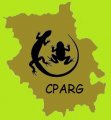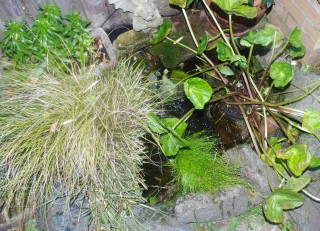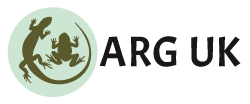About us
About Us
Welcome to CPARG - Cambridgeshire and Peterborough's local Amphibian and Reptile Group. ARGs are local, grassroots amphibian and reptile conservation groups spread out throughout the UK, usually organised by county. As a volunteer run group we get up to a whole range of activities – newt surveys, frogspawn counts, advice service, liaison with planning authorities and consultancies, data collection/collation, training, chytrid swabbing, talks and presentations. The opportunities are endless! Events are held on nature reserves and throughout the wider landscape, and while our focus is on Cambridgeshire there are good links between neighbouring ARGs with access to shared away-days, conferences and training available.
We are run by and for volunteers, and we'd like you to join. We're looking for members – people who might be interested in surveying, receiving training, attending talks, sharing their knowledge and experience, or getting involved in any way with amphibian and reptile conservation locally. We're also looking for new committee members to help with the running of the group, most importantly in organising and/or running events (surveys, training, talks, habitat management etc).
Map of some sites we work on:
Social Networking
Please join our Facebook for discussions with other members.
Twitter/X
Please follow us on Twitter for all of our latest updates.
Blog - WordPress
Please visit our blog for updates on our events and activities! CPARG has been active on Wordpress since 2016 and we share regular updates there.
News
News
Updated details on GCN training with Froglife
CPARG Relaunched in 2012
If you would like more information, to get involved or to be kept informed please email paul.furnborough@sjc.oxon.org to be added to the announcements list. If you’re interested in joining the committee or if you are a land owner/manager who is interested in involving us with your site please get in touch either by email or on 07508020437 after work hours. A website and facebook page will be launched shortly to keep everyone updated on what’s on.
Cambs Pond Project
Cambs Pond Project
Recent research as identified that urban ponds provide numerous and diverse roles including their ecological function with good quality ponds acting as stepping-stones and refuges for wildlife species within a suriunding of otherwise inhospitable habitat. With this in mind, we are currently looking to find out where all of Cambridge's urban ponds are in an attempt to learn more about the potential dispersal routes of the City's amphibians. It is important to know both where amphibians breed (in terms of public areas) but also where they may also hibernate, which is usually away from breeding ponds and in gardens. Of course amphibians will also breed in garden ponds too and this is useful additional information that we are hoping that you, the constituents of Cambridge will be able to help provide us with. If you're happy for us to make a visit to your garden to survey the pond or give you some advice on how to improve your pond or garden or amphibians then please also let us know of your address. If this is not the case, then please provide us with a grid reference of your pond's location which you can easily find using this free online tool.
Even small garden ponds like the one above can offer plentiful opportunities for amphibians to breed and feed. If you do have a garden pond, the please do get in contact and let us know what species of amphibians you find in it, whether it is stocked with any fish, how old the pond is and how big it is. It is hoped that this information will be used to help inform planning and management of urban areas within Cambridge to benefit amphibians and other wildlife which tend to share the same corridors.
Disclaimer: Any data you share with us will not be shared with any third party groups without your permission first.
Our Projects
Our Projects
CPARG prides itself with the important conservation research that the group runs throughout the county. Below are short summaries of some of these projects and information on how you can get involved.
Amphibian Surveys
CPARG monitors a number of amphibian populations around the county with the majority of the committee being great crested newt licence holders. There are sites of interest throughout Cambridgeshire which are home to the four most widespread amphibian species, common frog, common toad, smooth newt and great crested newt. A small number of sites are also home to some rarer species (for Cambridgeshire at least), such as the palmate newt. These are generally surveyed at night using a combination of methods such as torchlight surveys and bottle trapping. To get involved, keep an eye on our blog and our events.
Reptile Surveys
CPARG opportunistically monitors a small number of reptile populations around the county, with the focus being populations in or around Cambridge. These include the monitoring of slow worms at Wandlebury Country Park (see below) and of common lizards at Bramblefields Local Nature Reserve. To get involved, please keep an eye on our blog and our events.
Toads on Roads
Toads on Roads is a national initiative which aims to help set up and manage toad crossing across the country. Roads are a huge issue for amphibians, with the main threat being that of cars. Roads bisect amphibian migration routes between breeding ponds and over-wintering sites and so the aim of a toad crossing is to help as many toads as possible make it to the other side of the road. There are a number of registered toad crossings within the county, with one of CPARG's most active ones is in central Cambridge. Every year we are on the lookout for volunteers to help us with toad patrols throughout the county.
Toads have declined around 70% in the UK in the last thirty years, and being hit by cars is one of the main causes. The toad patrol is one way of making a real difference to protecting these remarkable amphibians. The toad patrol is active through the toad breeding season, usually from mid-February until April. Volunteers give the toads a helping hand, so that as many as possible make it safely across the roads to their breeding pond to spawn. Each patrol has it's own coordinator who helps to organise a rota, with volunteers signing up for between one and three hours around dusk, on nights when the toads are active. All you need is a bucket and a torch.
To find out more about the Stanley Road Toad Crossing, please contact the crossing coordinator Suzanne Little on 07957 179 993. If you'd like to know more about Toads on Roads in general, please contact Mark Goodman.
Cambridge Midwife Toads
Since 2015 CPARG has been monitoring the population of midwife toads (Alytes obstetricans) in central Cambridge. The study first started out as a population assessment but then quickly transformed into a disease monitoring exercise. It was feared that when the toads were introduced that they may have been infected with infectious diseases that are deadly to amphibians. These do not affect humans but they have caused huge declines in species around the world. Fortunately so far no toads have come back positive for the amphibian chytrid fungus (Batrachochytrium dendrobatidis). We'd like to thank the local residents for allowing us access to their gardens to carry out this important research. If you'd like to know more then please contact Steven Allain.
Wandlebury Slow Worms
Since 2017, CPARG has been monitoring the population of slow worms (Anguis fragilis) at Wandlebury Country Park. We have been working to establish the demography of the population and the extent of which they use the site. This has been achieved through the use of structured surveys, which are ongoing. If you'd like to get involved, please get in touch.
Falling Through The Cracks
Burial grounds are a haven for wildlife given that they are generally safe from development, and are managed in a way that provides both plentiful food and shelter for wildlife. Given the number of burial grounds in Cambridgeshire and the lack of information regarding the presence or absence of absence of amphibians or reptile species, we've developed a package of materials to assist volunteers and burial grounds managers to help fill in these gaps. If you would like to take on the monitoring of a burial ground near you, please get in touch with Terry Moore, who will be able to assist you with this.
Dewsbury Trap Analysis
Information coming soon!
Membership
Membership
CPARG is always happy to welcome new members whether they be amateur amphibian and reptile enthusiasts or professional ecologists. This mix of backgrounds helps to give CPARG it's strong dynamic. If you'd like to know more about membership and the benefits provided, please feel free to contact us before you join. To find our about how CPARG is operated, please feel free to read the CPARG Constitution (available here). If you've got a membership query, please contact Helen Moore, our Membership Secretary.
Membership
You can become a member of CPARG by using the 'Subscribe' button below and paying via PayPal. Our membership fees are £5 per year and membership runs until the 31st December. When joining through PayPal, please use the login details sent to your email address to access ARGWEB and complete the details found under 'My CPARG Account', including the volunteer agreement. Alternatively, you can fill out a membership form and pay via bank transfer or cheque. Please read the ARG UK Generic Risk Assessment and ARG UK Lone Working Procedures (below) before becoming a member.
Membership Documents
ARG UK Generic Risk Assessment - Click Here
ARG UK Lone Working Procedures - Click Here
CPARG Membership Form - Click Here
ARGWEB
ARGWEB is the online system that CPARG uses to monitor sites, manage it's data and assist in various administrative roles. You can log-in using the button below and record your sightings and us ARGWEB's many other features.
Photo gallery
Photo Gallery
Contact us
Contact Us
To join our email list please email:
candparg@googlemail.com and CC steveallain@live.co.uk
To discuss projects or partnerships please contact Steven Allain, Chair or telephone 07472235469.
Membership
To join CPARG please contact Helen Moore, our Membership Secretary.
Volunteering
Please see contact details for specific volunteering opportunities in the Events tab. Alternatively, for regular fixed sessions see contacts below.
For information about local toad crossings or any toad crossing related queries please contact Mark Goodman, our Toads on Roads Officer.
Regular fixed sessions coming soon.
Photos
To submit photos of events, species or habitats to our gallery please email Mario Shimbov or alternatively upload them to our Facebook page and make it clear you'd like to see the photos posted on the website.
Advice
For general herp advice please check these excellent FAQs:
http://www.froglife.org/advice/FAQs/index.htm
http://www.arc-trust.org/advice/
If the answer you need is not there please contact our Advice Officer, Malcolm Busby.
If you've seen what you suspect to be a non-native species then please contact Steven Allain.
We have a small team dealing with possible wildlife crimes committed against herp species - please contact Steve Parnwell who will liaise with the team.
Upcoming Events
Upcoming events will be listed here.
Latest News
- Why not visit our blog?
23/04/2018 1:27 pm - Volunteers needed for the Big Spawn count!
14/03/2016 7:59 pm - Cambridge toads are on the move!
08/03/2016 6:22 pm - CPARG volunteers help manage ponds for great crested newts (and other amphibians!)
08/03/2016 6:07 pm - Frogwatch – Big Garden Spawn Count Volunteers Needed!
28/12/2013 4:23 pm
© Cambridgeshire and Peterborough Amphibian and Reptile Group
Website hits: 79205
View All | Find out how to get a mini-website for your ARG
© ARG UK Local Groups mini-websites 2026
Wind powered websites by Aye-aye Design.


